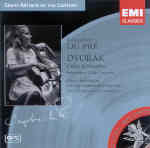Jacqueline Du Pré is so beloved in the U.K. for her excellent recording of the Elgar Concerto, and her reputation is so sacrosanct that we seldom hear any criticism of her at all. But her recordings don’t rise to a uniform level of excellence, though unlike that other tragic icon, Kathleen Ferrier, Du Pré at least was a soloist of international caliber whose finest work on disc gives proof positive of her talent. That said, neither of these recordings stands with the best. The Dvorák concerto suffers from Du Pré’s febrile tone under pressure, particularly in her upper register, and the finale drags badly, particularly in the coda.
The same feeling of heaviness pervades the Schumann concerto, though here it’s the first movement that proves most problematic. Curiously, the problem seems not to be tempo per se, but rather Du Pré’s habit of overloading phrases with her somewhat uniform idea of expressivity, which consequently leads to choppiness in the ensuing passages. Add to this the fact that she is balanced far too forward in both works (though the Chicago sonics are more open and uncongested), and the result, while never unpleasant, fails to give unqualified satisfaction. You can do much better with the reference recordings listed above.
































